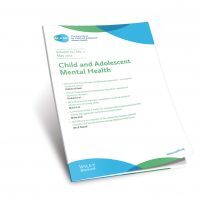ACAMH Website Content Types
-

Covid-19’s impact on Loneliness and Mental Health: A Study of Schizotypal Traits and Paranoia
The Covid pandemic lockdown has affected us differently, with some people being impacted more than others. Extensive research has indicated that lockdowns – which broadly include isolation measures, such as, in the UK, being required to stay at home unless for essential reasons – have disproportionately impacted individuals with higher levels of paranoia.
Read more -

CAMH Editorial: Volume 28, Issue 2, May 2023
CAMH May 2023 Editorial is now available to read.
Read more -

Investigating the impact of the COVID-19 pandemic on older adolescents’ psychological wellbeing and self-identified cognitive difficulties
Open Access paper from JCPP Advances – ‘The COVID-19 pandemic coincides with growing concern regarding the mental health of young people. […] At three timepoints, independent samples of young people aged 16–18 years completed an online survey. Data collection coincided with periods of lockdown and young people returning to school. The survey assessed subjective impacts of the pandemic on overall wellbeing, anxiety and cognitive function.’ Meg Attwood (pic) et al.
Read more -

Commentary: Optimism and guidance for improving treatment effects among children with callous-unemotional traits – reflections on Perlstein et al. (2023)
Open Access paper from the JCPP – ‘The results of Perlstein et al. (2023) offer the first meta-analytic evidence against the long-held belief that CU traits confer treatment resistance. […] I argue that Perlstein et al. (2023) offer both optimism and guidance for improving treatment effects among children with conduct problems and CU traits’. Georgette E. Fleming (pic)
Read more -

Socioeconomic disadvantage and high-effort coping in childhood: evidence of skin-deep resilience
Paper from the JCPP – ‘The current study hypothesized that skin-deep resilience – a pattern wherein socioeconomic disadvantage is linked to better mental health but worse physical health for individuals with John Henryism high-effort coping – is already present in childhood.’ Katherine B. Ehrlich (pic) et al.
Read more -

The genetics of gaming: A longitudinal twin study
Open Access paper from JCPP Advances – ‘We examined the genetic and environmental contribution to gaming behavior, including sex differences, continuity and change, in a longitudinal cohort of twins.’ Anders Nilsson (pic) et al.
Read more -

Is there evidence of a causal link between childhood maltreatment and ADHD (Attention Deficit/Hyperactivity Disorder)? A systematic review of prospective longitudinal studies using the Bradford-Hill criteria
Open Access paper from JCPP Advances – ‘This study systematically reviews and qualitatively synthesizes the research evidence relating to this question using Bradford-Hill criteria for establishing causality—strength, temporality, dose-response and plausibility.’ Paraskevi Bali et al.
Read more -

Social gradient in use of health services and health-related quality of life of children with ADHD (Attention-Deficit/Hyperactivity Disorder): A systematic review
Open Access paper from JCPP Advances – ‘This study aims to systematically synthesise evidence of equity and equality in health service use/costs and health-related quality of life (HRQoL)/wellbeing of children with ADHD across socioeconomic (SES) classes.’ Abraham Sevastidis et al.
Read more -

Editorial Perspective: When is a ‘small effect’ actually large and impactful?
Open Access paper from the JCPP – ‘In this short review, we utilise simulations to demonstrate that a relatively small shift in mean scores on mental health measures can indicate a large shift in the number of cases of anxiety and depression when scaled up to an entire population. This shows that ‘small’ effect sizes can in some contexts be large and impactful.’ Emma Grace Carey et al.
Read more -

Research Review: The internalizing paradox – youth anxiety and depression symptoms, psychotherapy outcomes, and implications for research and practice
Paper from the JCPP – ‘Drawing on recent research, we examine candidate explanations for this paradox to help identify strategies for addressing it by improving outcomes for youth depression.’ John R. Weisz (pic) et al.
Read more